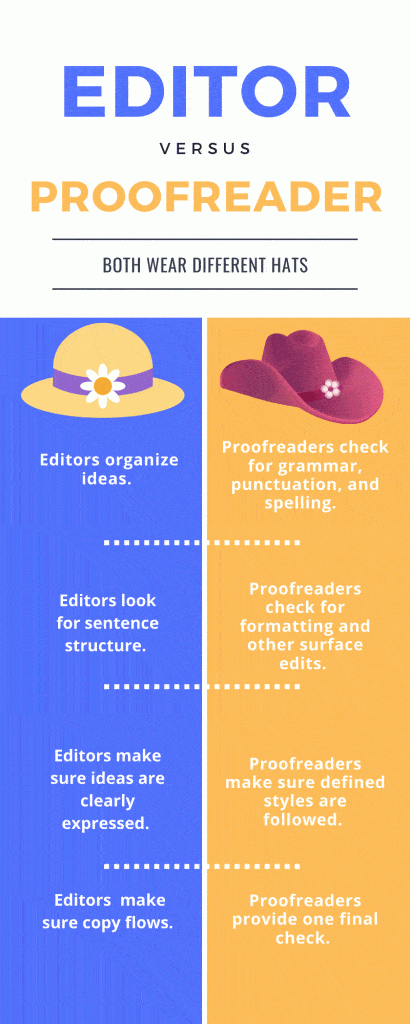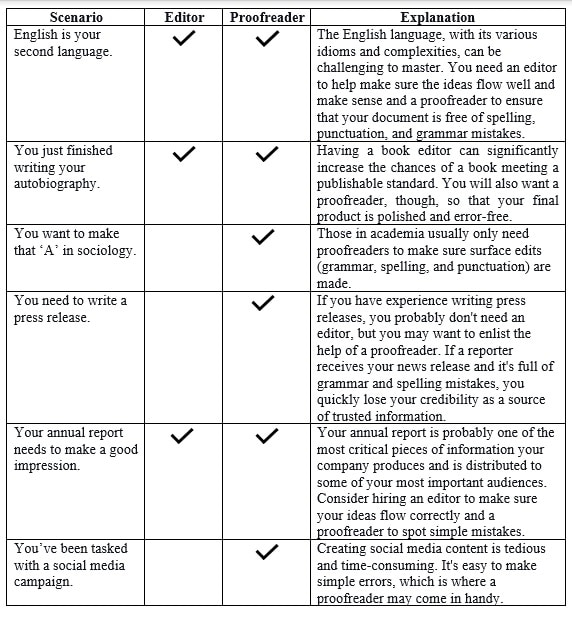Editors vs. Proofreaders: They Don’t Wear the Same Hat
September 18, 2020
The words you put out on behalf of your company are essential to your bottom line. They reflect your brand and your mission, and they attract potential customers or donors.
With so much at stake, it is imperative that you have multiple sets of eyes on your final copy before it goes out for all the world to see.
So, who should those eyes be?
Every piece of solid writing has three people behind it: the writer or author, the editor, and the proofreader. And they all play different roles in the production of outstanding content.
An editor is not a proofreader. And a proofreader is not an editor.
Both an editor and a proofreader may use the mighty red pen, but they have different jobs.
“The two roles are different. Editors do developmental and line edits. Proofreaders make sure the copy is free of errors and adheres to house style,” said Sophia Stewart, an assistant editor at The Los Angeles Review of Books.
An Editor’s Hat
Someone in the editor’s role looks for concrete ways to improve the quality of writing, particularly when it comes to language use and expression.
As the author, you sometimes become too close to what you’ve written and need an outside, objective look at your work. A good editor will look for ways to sharpen your writing, make it more consistent, and amplify the overall readability.
An editor may move sentences or paragraphs around, cut excess words, and make sure the tone is conveyed accurately.
Put simply, an editor’s role is to ensure your writing has the maximum impact, and your audience is stirred to take action, feel an emotion, or whatever it is you want them to do.
An editor will look for the following:
Clarity: Does each sentence convey what you want it to say? Are there vague details or confusing descriptions that could confuse your reader?
Awkward sentences: An editor will go back through your copy to make sure your sentences are not clunky.
Sentence length: It’s a good idea to make sure you strike a balance between long sentences and shorter sentences. This leaves some variety for your readers. Using too many short sentences can make your copy come across as choppy.
Unnecessary words: Are there too many words burying what you’re trying to say? An editor will look for words that don’t enhance or add to your written piece’s meaning.
Passive vs. active voice: In most cases, you will want to write in the active voice since doing so makes your writing more concise and efficient. An editor will go back through and make sure you’re using an active voice.
Flow: An editor will look for the flow of ideas and concepts. If necessary, they will shift paragraphs and sentences around to make sure your point comes across clearly.
A Proofreader’s Hat
A proofreader, on the other hand, will check for surface-level mistakes. They take a quality piece of writing and make it shine, looking specifically for the following:
- Spelling errors
- Correct use of commas, colons, and semicolons
- Style mistakes (Associated Press, Chicago, or your in-house style)
- Appropriate use of quotation marks and apostrophes
- Double spaces or any other wonky formatting

Graphic by Laura Frnka-Davis
Right-brained vs. Left-brained
Editors and proofreaders possess different talents and skillsets.
Based on the research done in the 1960s by psychobiologist and Nobel Prize winner Roger W. Sperry, you might conclude that they each use different sides of their brains to complete their respective tasks.
According to Sperry’s research, people who are more creative and artistic tend to be right-brained, while the more verbal, analytical, and orderly are left-brained.
Since editors consider a written piece’s emotional appeal, editors may be more right-brained, according to Sperry’s findings.
And because proofreaders base their jobs on technical accuracy and stick to strict rules and guidelines, proofreaders, according to Sperry’s research, would tend to be more left-brained.
It is often said that editing is an art, and proofreading is a science. Both require proficiency and command of the English language, but just in different ways.
“The two tasks require completely different skill sets,” said Amanda Eisele, a teacher in Bryan-College Station, Texas. “One is for content and organization while the other is for grammar. Not everyone is a grammar expert.”
There is a time for everything, including proofing and editing.
Did you ever stop to think about how many steps a book goes through before it’s produced for your enjoyment? Multiple!
First, the author comes up with the idea, drafts the book, and then they finesse it until they are completely satisfied with it. This is known as the revision stage, and it can go through multiple rounds.
The author or ghostwriter will go through the manuscript to make sure ideas are entirely developed, re-order paragraphs, add material, etc.
While you do have the option to self-edit, it can be challenging to be objective. It’s best to hire a professional book editor who will offer an outside perspective, provide suggestions for improving clarity and readability, and organize the content so it flows.
Editing plays an important role but should be done so that it does not lose the original writer’s authenticity.
According to owlocation, a blog by self-publishing expert, advocate, and former trade newspaper editor Heidi Thorne, “Editing should be done to make the writing better, not to turn it into something it’s not.”
Then, after the editing stage is complete, it’s time for the proofreader to work their magic.
Proofreading is one of the last steps in the writing process and is done before the book is published. It’s a final sweep of the content and helps solidify the credibility of the author.
Proofreading requires an innate level of detail and precision and plays a critical role in producing the final product.
While your editor could technically also perform proofreading duties, it is best practice to have someone who’s not familiar with the book serve as your proofreader. That way, your book gets the final read-through and polishing it deserves.
If you’re concerned about how much it will cost to hire a professional book editor and/or proofreader, companies like The Writers For Hire provide a talented group of editors and proofreaders at reasonable rates.
Do you need an editor, proofreader, or both?
How do you determine if you need the skills of an editor or a proofreader or both? In general, if you want to improve your written English effectively, you need an editor. If you want your document checked for syntax, spelling, or grammar mistakes, enlist a proofreader.
Here are some more examples:

Professional Editing and Proofreading Services
Several editing and proofreading tools, such as Grammarly and Microsoft Word Editor, are available via the Internet to help with very basic editing and proofreading.
Grammarly is an artificial intelligence-based writing tool that checks for common grammar, spelling, and punctuation mistakes.
You can access the tool by going to the Grammarly.com site or as a Microsoft extension, meaning it integrates with your Office applications (Outlook, Word, and PowerPoint) and your favorite browsers, making it a great tool to check your social media posts for errors.
You can download the free version, and it will provide you with the basic support, or you can upgrade and pay $11 to $12 monthly for the premium package. The premium package checks for punctuation, context, sentence structure (passive vs. active voice), and suggests alternate words.
Grammarly will also check for potentially clunky sentences and suggest alternatives for making your writing more concise. It will also review your tone and check for missing words and formatting mistakes, like extra spaces.
While it’s certainly helpful, it’s not 100% foolproof. Some of its suggestions don’t make sense, so you will want to double-check your work once you’ve run it through Grammarly.
Microsoft Word provides a built-in editor as well. It’s useful for catching spelling and some grammar mistakes and is an extension for Chrome and some other browsers.
It’s cheaper than Grammarly but is not nearly as robust.
Microsoft Word can be a helpful tool for very basic documents, but it’s not a good idea to rely on it 100%.
When it comes down to it, a digital program cannot or should not replace a human being for these functions.
Editing and proofreading require special skills and training, so it’s smart to call on experts for these critical jobs. After all, you don’t want to pour hours into writing a book, brochure, newsletter, annual report, blog post, or website copy only to fail to convey your message or to present material riddled with careless mistakes.
For more resources on editing and proofreading, here is some suggested reading:
Think You’re Done Editing? Take a Step Back
Rewriting: What to do when you have to rephrase someone else’s words































This is a great article and I appreciate how simple you make it to understand. This is a question I often hear as a freelancer within the field from potential clients.